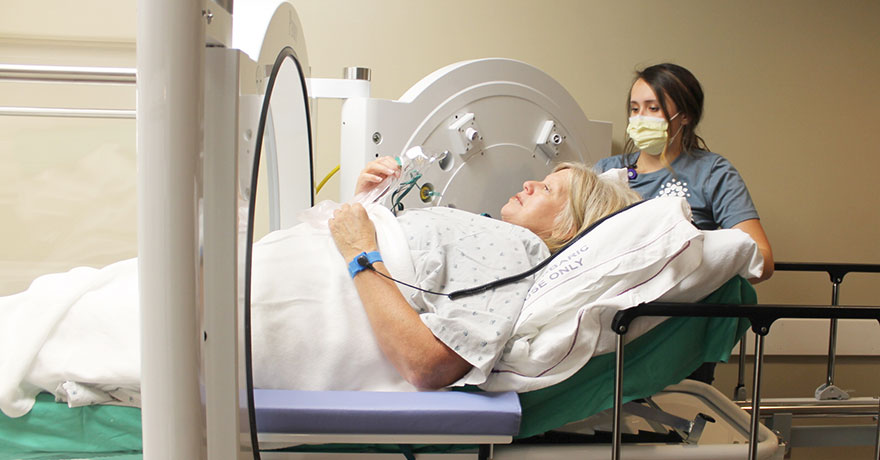Hyperbaric Oxygen Therapy Can Help Heal Soft Tissue Radionecrosis
- Summer 2023

Soft tissue radionecrosis refers to the delayed effects of radiation therapy which results in tissue breakdown from the impaired blood supply in radiation-damaged tissue.
Radiation can damage capillary beds and arterioles which lead to relative tissue hypoxia resulting in the characteristic fibrosis. These tissue changes can develop over time, typically six months to several years after the exposure.
Examples of soft tissue radionecrosis include radiation proctitis (inflammation of the lining of the rectum), enteritis (inflammation of the small intestine) and cystitis (inflammation of the bladder). These three conditions are caused by radiation therapy, commonly used to treat invasive cancers in the abdomen and pelvic area. This therapy affects multiple organs, including the prostate, rectum, intestines and bladder. While it is an effective tool for eliminating cancer, the tissues surrounding a tumor may become inflamed due to the radiation.
A number of studies have shown that hyperbaric oxygen (HBO) therapy is useful in treating radiation-induced proctitis, enteritis and cystitis in the context of radiation-induced inflammation. Patients are able to recover from their conditions, improving their quality of life after undergoing cancer treatment. Key research findings include:
- 84% overall response rate for soft tissue necrosis treated with HBO
- 90% reported positive results with use of HBO for treating radiation enteritis
- 89% of patients experienced relieved chronic radiation proctitis symptoms
What is Hyperbaric Oxygen Therapy?
HBO is a treatment in which an individual breathes 100% oxygen intermittently while inside a hyperbaric chamber that is pressurized to greater than sea level pressure. HBO can be the primary treatment modality or may be provided as an adjunct to surgical or pharmacologic intervention. HBO is a proven therapy for many indications including wound healing, delayed radiation injuries, crush injuries and sudden hearing loss, to name a few.
When is HBO Appropriate for Patients with Proctitis, Enteritis or Cystitis?
Patients who have undergone radiation therapy may benefit from HBO treatment of their radiation-induced proctitis, enteritis or cystitis as an adjunct to conventional treatments. The three conditions are characterized by the following clinical presentations, indicating use of HBO treatment:
- Radiation proctitis: loss of blood vessels in irradiated tissues, fibrosis, epithelial atrophy and disordered formation of new vessels (telangiectasia)
- Radiation enteritis: inflammation of the small intestine, swelling of the endothelial lining of arterioles, fibrosis, small bowel dysfunction and structuring disease
- Radiation cystitis: disruption of urothelium and bladder vasculature as a result of edema and perivascular fibrosis and detrusor muscle dysfunction caused by increased fibrosis and smooth muscle edema
How does HBO Help?
Capillaries can regrow by the process of angiogenesis, but in the hypoxic radiation-damaged tissue, the new capillaries tend to grow disorganized resulting in telangiectasias. It has been noted that radiated tissue does not spontaneously revascularize in the same way that other wounded tissues do. This is related to the diffuse wounding pattern and resulting shallow oxygen gradient. Because the oxygen gradient is shallow, the physiological response which identifies an injured area does not develop as it normally would. Hyperbaric oxygen therapy exposes the radiation-injured tissue to a seven to tenfold increase in oxygenation which dramatically increases the oxygen gradient. This repeated process will eventually stimulate angiogensis and resultant healing.
Brookings Health’s Wound Center includes two HBO chambers and is staffed by a multidisciplinary team of providers, nurses and technicians with advanced training in wound care. The approach to wound care is aggressive and comprehensive, coordinating traditional and advanced therapies and techniques that are proven to reduce healing time and improve healing rates.
For more information:

Wound Care Program Director
(605) 696-8068
rboldt@brookingshealth.org
System Providers:
 Katie Jones, CNP
Katie Jones, CNP
Primary Care, Hospitalist Program, Wound Care, Hyperbaric Oxygen Therapy
Brookings Hospital, Wound Center, The Neighborhoods at Brookview
 Nephi Jones, DPM
Nephi Jones, DPM
Podiatry, Wound Care, Orthopedics, Sports Medicine
Avera Medical Group Specialty Care, Wound Center, Brookings Hospital
 Jill Kruse, DO
Jill Kruse, DO
Hospitalist Program, Wound Care, Hyperbaric Oxygen Therapy
Brookings Hospital, Wound Center

